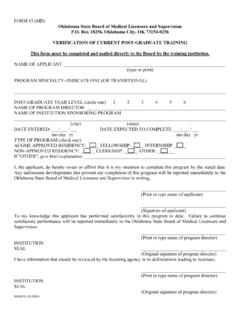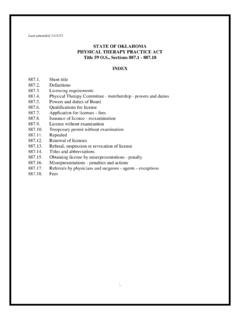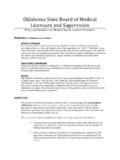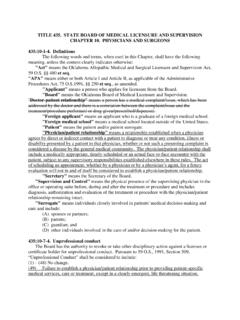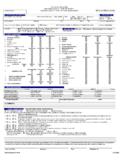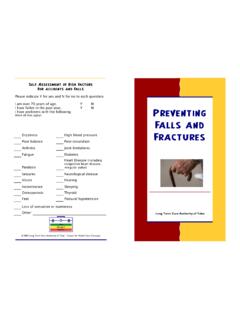Transcription of Provider Responsibilities and Rights - Oklahoma Medical …
1 Oklahoma Health Care Providers Responsibilities and Rights Under Certain Medical Treatment Laws Basic nondiscrimination obligation: Medical treatment, care, nutrition or hydration may not be withheld or withdrawn from an incompetent patient because of the mental disability or mental status of the patient. Required by Section (B) of Title 63 of the Oklahoma StatutesWhat if you disagree with a direction by or on behalf of your patient to provide Medical treatment? Key Concepts Life-preserving health care service : a health care service the denial of which, in reasonable Medical judgment, will result in or hasten the death of the patient.
2 Person authorized to make health care decisions for the patient : For minors not legally able to consent to health care services, a custodial parent or guardian. For others currently incapable of making their own health care decisions: guardian with authority to make Medical decisions; health care proxy or attorney-in-fact; or other person authorized under common law (consult attorney for help in determining). If a patient or person authorized to make health care decisions for the patient directs life-preserving treatment for the patient that you provide to other patients, you may not deny it: On the basis of a view that treats extending the life of an elderly, disabled or terminally ill individual as of lower value than extending the life of an individual who is younger, nondisabled or not terminally ill.
3 Or On the basis of disagreement with how the patient or person legally authorized to make health care decisions for the patient values the trade-off between extending the length of the patient s life and the risk of disability. Required by Nondiscrimination in Treatment Act (Sections and of Title 63 of the Oklahoma Statutes) For treatment not required under the Nondiscrimination in Treatment Act, but that is directed by a patient with decision-making capacity, or by or on behalf of the patient under a valid advance directive: You must, as promptly as practicable, take all reasonable steps to arrange care of a qualified patient by another physician or health care Provider willing to comply.
4 And Pending completion of the transfer, you must provide any directed treatment whose denial would in reasonable Medical judgment be likely to result in the death of the patient, except Treatment you are physically or legally unable to provide; Treatment you are physically or legally unable to provide without thereby denying the same treatment to another patient; or The requirement does not change any legal obligation or lack of legal obligation you may have to provide treatment, nutrition or hydration to a patient who refuses or is unable to pay for them. Required by Oklahoma Advance Directive Act (Section of Title 63 of the Oklahoma Statutes) What if you disagree with a direction by or on behalf of your patient to withhold or withdraw Medical treatment?
5 You must, as promptly as practicable, take all reasonable steps to arrange care of a qualified patient by another physician or health care Provider willing to comply. Required by Oklahoma Advance Directive Act (Section of Title 63 of the Oklahoma Statutes) What does, and does not, violate Oklahoma s law against assisting suicide? It IS a violation if, with the purpose of assisting another person to commit or attempt to commit suicide, you knowingly: Provide the physical means by which another person commits or attempts to commit suicide; or Participate in a physical act by which another person commits or attempts to commit suicide.
6 It is NOT a violation if you are a licensed health care professional and you: Administer, prescribe or dispense medications or procedures for the purpose of alleviating pain or discomfort, even if their use may increase the risk of death, so long as such medications or procedures are not also furnished for the purpose of causing, or the purpose of assisting in causing, death for any reason; or Withhold or withdraw a medically administered, life-sustaining procedure. However, this does not change your duty of care or the legal requirements concerning acts or omissions regarding medications or procedures to alleviate pain or discomfort or the withholding or withdrawal of life-sustaining procedures.
7 Required by Assisted Suicide Prevention Act (Sections and of Title 63 of the Oklahoma Statutes) What are the legal requirements regarding cardiopulmonary resuscitation and do not resuscitate (CPR & DNR)? You must assume patient consent to CPR whenever the patient undergoes cardiac or respiratory arrest UNLESS you have actual knowledge of one of the following: The patient s Medical record accurately records the patient s refusal to consent to CPR, given to the attending physician; A DNR under the Oklahoma Rights of the Terminally Ill or Persistently Unconscious Act was executed for the patient; or The patient s valid advance directive directs that life-sustaining treatment not be performed in the event of cardiac or respiratory arrest.
8 A minor s Medical records accurately record the parent or guardian s refusal to consent to CPR for the minor, provided: If the minor has sufficient understanding and appreciation of the nature and consequences of the refusal and is capable of objecting, the Medical record accurately records that the minor has not objected; or In the case of a disabled infant with life-threatening conditions, if in reasonable Medical judgment CPR will be most likely to be effective in correcting or ameliorating the life-threatening conditions, in reasonable Medical judgment: the infant is chronically and irreversibly comatose; the provision of such treatment would merely prolong dying; not be effective in ameliorating or correcting all of the infant s life threatening conditions; or otherwise be futile in terms of the survival of the infant.
9 Or the provision of such treatment would be virtually futile in terms of the survival of the infant and the treatment itself under such circumstances would be patient s Medical record accurately records refusal to consent to CPR based on the known wishes of the patient by an incapacitated patient s guardian, health care proxy or attorney-in-fact for health care decisions; AND The reason the guardian, proxy or attorney-in-fact, rather than the patient, directed the DNR is recorded in the patient s Medical record; or Prior to the decision, the patient s attending physician has: instructed the guardian, proxy or attorney-in-fact in writing that he or she is deciding what the incapacitated patient would have wanted if the patient could speak for himself or herself; encouraged consultation among all reasonably available representatives, family members and persons close to the incapacitated patient to the extent feasible in the circumstances of the case; and whenever possible, explained to the guardian, proxy or attorney-in-fact and family members the nature and consequences of the decision to be made.
10 Evidence of its provision is to be documented in the patient s Medical record. The attending physician for an incapacitated patient without a representative knows by clear and convincing evidence that when competent, on the basis of information sufficient to constitute informed consent, the patient refused to consent to CPR. Clear and convincing evidence includes oral, written, or other acts of communication between the patient, when competent, and family members, health care providers or others close to the patient with knowledge of the patient s personal desires. You are not required to begin or continue CPR when, in reasonable Medical judgment, it would not prevent the imminent death of the patient.
